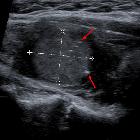multiple endocrine neoplasia type IIa
Multiple endocrine neoplasia (MEN) type IIa, also known as Sipple syndrome, accounts for most cases of MEN2 and is characterized by:
- pheochromocytomas: in 50% of patients, often bilateral, and can be extra-adrenal
- medullary thyroid cancer: 100% of patients, aggressive, and may secrete calcitonin
- parathyroid hyperplasia: only seen in 20% of patients, and often presents with hypercalcemia and renal calculi
Mnemonic:
- PMP
Pathology
Genetics
A small proportion of individuals have a RET D631 proto-oncogene mutation.
See also
- MEN1 (Wermer syndrome)
- MEN2 (multiple endocrine adenomatosis)
- MEN2a (Sipple syndrome)
- MEN2b (mucosal neuroma syndrome)
- familial medullary thyroid carcinoma
- MEN4
- Carney complex
Siehe auch:
- Nierensteine
- Phäochromozytom
- multiple endokrine Neoplasie Typ 1
- Medulläres Schilddrüsenkarzinom
- MEN IIb
- Multiple endokrine Neoplasien Typ 2
und weiter:

 Assoziationen und Differentialdiagnosen zu MEN IIa:
Assoziationen und Differentialdiagnosen zu MEN IIa:




